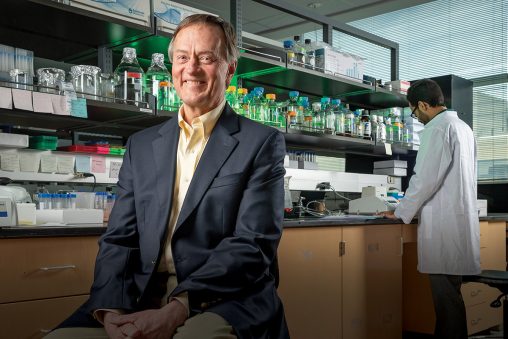
A gift from three-time Wright State graduate Doug Hull launches a transformative opportunity to build a collaborative hub where student research in genetics and genomics can flourish.
“Even a blind hog can find an acorn if he roots long enough.”
For more than a decade, Doug Hull read those words on a handwritten 3×5 card in the laboratory of Wright State University biological sciences professor George Kantor.
“It hit home with me,” Hull recalled.
That message of persistence and perseverance resonated with Hull as he worked with Kantor as an undergraduate student, graduate research assistant, and research associate. It also helped inspire his recent gift to the College of Science and Mathematics.
In September 2023, Hull established the Acorn Endowed Fund, which will provide student scholarships, encourage experiential learning, and support the creation of a collaborative hub focused on genetic and genomics research at Wright State.
“I’m excited and anxious for it to start,” said Hull.
To finance the Acorn Endowed Fund, Hull donates to the university by making Qualified Charitable Donations and rolling over the Required Minimum Distribution from an IRA. He has also made a bequest to the university in his will, which will allow the endowment to grow in perpetuity.
“This is the largest gift I’ve ever made, but it all makes sense,” he said. “You have to pay it forward. I was given a lot of opportunities at Wright State.”
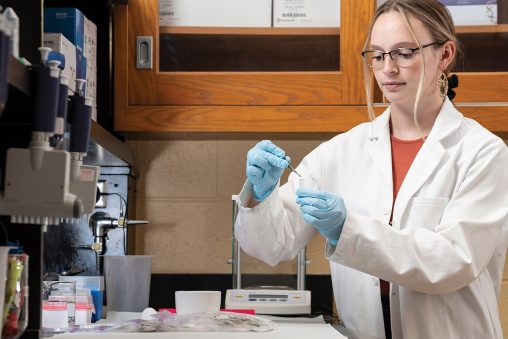
Kayci Johnson, a graduate student in biological sciences, extracts DNA from an endangered species of plant.
For Hull, those opportunities began in the 1970s in Kantor’s small, one-room laboratory on the top floor of Oelman Hall.
Thanks to the grants that Kantor—who retired from the university in 1998—received from the National Institutes of Health and the National Cancer Institute, Hull was able to engage in hands-on research as a student and receive a stipend for his work for a decade as a full-time research associate.
Kantor’s projects, which combined biochemistry, molecular biology, and genetics, focused on cancer research. Under Kantor’s tutelage, Hull assisted in examining the potential of ultraviolet light to mutate a cell and transform it into a cancer cell. This focus on DNA repair mechanisms in human cells was designed to demonstrate the relationship between DNA function and structure and cancer.
“It was very interesting. I could never explain what I was doing to family, but it was fun for me,” Hull recalled. “The techniques we were using are nothing compared to today. The technology is more advanced now, and the understanding is much more advanced, but we tried to do what we could.”
When federal budget cuts sliced Kantor’s grants (and Hull’s stipend) in half, Kantor introduced Hull to a medical geneticist at Dayton Children’s Hospital, Richard C. Juberg, who chaired the Department of Medical Genetics and Birth Defects that provided cytogenetics and genetic counseling services to the Miami Valley.
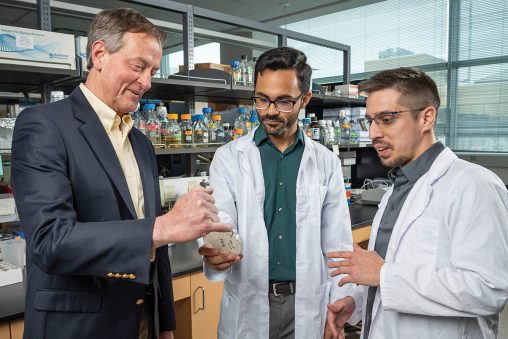
Doug Hull, left; Rahul Shah, a Ph.D. in biomedical sciences student; and Zachary Thompson, an undergraduate biochemistry and molecular biology student.
While continuing to help Kantor with his research, Hull gained additional research experience and income at Dayton Children’s, where he created the first laboratory in Dayton to culture and evaluate cells collected through amniocentesis. Those were the early days of amniocentesis and Hull’s first introduction to clinical genetics.
“It was a very exciting opportunity,” he recalled.
After earning his bachelor’s degree in biological sciences in 1975 and a master’s degree in molecular biology in 1978, Hull became interested in learning how to trade stocks. He began taking business courses during his tenure as research associate and went on to earn his M.B.A. in 1985, just as Kantor’s final research grant was wrapping up.
“The mad scientist became a business person,” quipped Hull, who was only unemployed for about six weeks before he began working for Dayton Power and Light (DP&L).
“It wasn’t that different from what I had done in biology and research. It’s managing budgets, doing quantitative analysis, doing research to evaluate how and why you’re doing things,” he explained. “It worked out pretty well.”
Hull retired from DP&L in 2010. He then spent four years as chief financial officer at WYSO Public Radio, followed by three years as CFO for the Dayton Society of Natural History/Boonshoft Museum of Discovery and since 2019 as CFO for the Family Medicine Education Consortium.
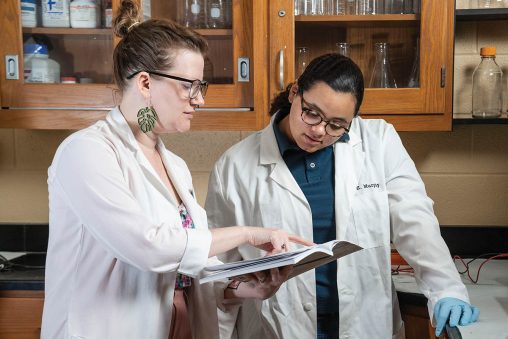
Ellen Lee, left, a Ph.D. in environmental sciences student, and Emily Murphy, an undergraduate biological sciences and music performance student, examine the results of bird samples tested for New Castle disease.
When Hull wanted to do more for his community and create opportunities to further education, he turned to his alma mater to give back.
“We are so grateful to Doug,” said Jeffrey Peters, professor and associate chair of biological sciences. “The things we are going to be able to do with these funds to help students are beyond my wildest dreams. It’s a wonderful, generous gift and opportunity.”
Hull’s gift will be evenly distributed between program development and student scholarships. Program funds will be used to satisfy a wide array of needs, from purchasing reagents that are used at the bench to collect data, to providing opportunities for students to attend genetics conferences where they can network and present their own research, to developing a genetics concentration within the bachelor of biological sciences degree.
Looking ahead, Peters would like to see the College of Science and Mathematics offer a Bachelor of Science in Genetics.
“Genetics is one of the fastest-growing fields in the job market,” said Peters. “Over the next couple of years, we’re going to see a lot of job opportunities. Our hope is that we can start preparing students to fill those openings.”
Hull’s gift will also support the establishment of a collaborative research hub where students—both undergraduate and graduate—will gain valuable, hands-on experience working alongside faculty on genetics research.
“His funding opens that door,” said Peters. “What I’m most excited about is being able to work with these students closely.”
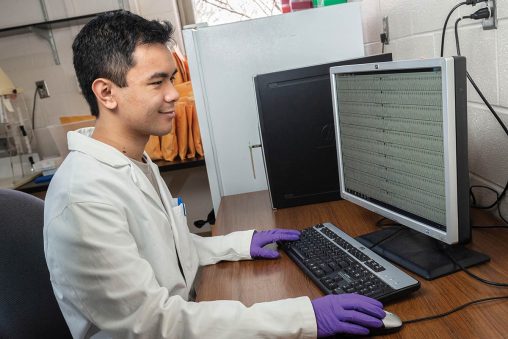
Gerone Sta. Ana, an undergraduate biological sciences student, examines DNA sequencing results obtained from a species of Australian duck.
Shulin Ju, associate professor of biological sciences, will oversee the collaborative research hub.
“I’d like to express my deepest gratitude to Doug for his incredible support of our genetics and genomics program,” said Ju. “As the program director, I am thrilled to oversee its progress, and I am excited about the transformative impact we will continue to make together.”
Peters envisions most of the research projects will be developed jointly between students and faculty. However, he welcomes the opportunity to partner with external entities such as Wright–Patterson Air Force Base and other regional employers.
“We would like to form collaborations with potential employers where we may be able to create direct funnels of students into their workforce,” he said. “We want to make sure our students are getting the skills these employers are looking for.”
Another component of Hull’s gift is the creation of the Hull Scholars Program. A minimum of one Douglas R. Hull Undergraduate Scholar and one Douglas R. Hull Graduate Scholar will be selected annually. The students will receive scholarship support to fund their experiential learning and research.
“I’m happy to have the opportunity to help others pursue their dreams and, hopefully, graduate without a lot of debt,” said Hull.
All of the initiatives supported by Hull’s gift will boost the recruitment and retention of students and ultimately increase graduation rates.
“And, of course, hands-on experience makes students more employable. It’s really exciting to have this opportunity,” said Peters. “I hope we are recruiting students from the Dayton area and beyond, bringing them to our program. To me, that is the signature of success, when we have students applying to our program who might not otherwise go to Wright State.”
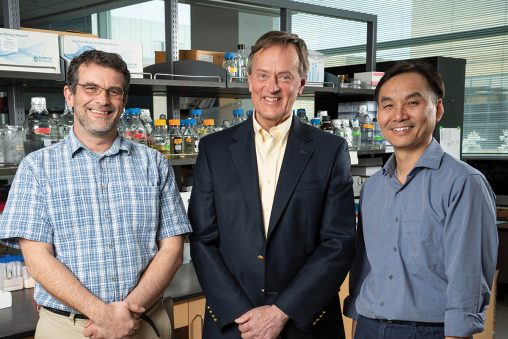
Jeffrey Peters, professor and associate chair of biological sciences, left; Doug Hull; and Shulin Ju, associate professor of biological sciences.
Hull’s Wright State story comes full circle as he helps current and future generations of students enjoy the same limitless opportunities he benefited from as a young researcher with a passion for genetics.
“Wright State has always been important to me,” said Hull. “It’s exciting to think that even one student could benefit from my gift and their ideas about the future might be enhanced with the opportunities this money could provide.”
Hull joined Wright State University’s Foundation board July 1, 2024.
This article was originally published in the 2024 issue of the Wright State Magazine. Read more stories at wright.edu/magazine.

 Wright State names Rajneesh Suri dean of Raj Soin College of Business
Wright State names Rajneesh Suri dean of Raj Soin College of Business  ‘Only in New York,’ born at Wright State
‘Only in New York,’ born at Wright State  Wright State president, Horizon League leaders welcome new commissioner
Wright State president, Horizon League leaders welcome new commissioner  Wright State celebrates homecoming with week-long block party
Wright State celebrates homecoming with week-long block party  Wright State baseball to take on Dayton Flyers at Day Air Ballpark April 15
Wright State baseball to take on Dayton Flyers at Day Air Ballpark April 15 